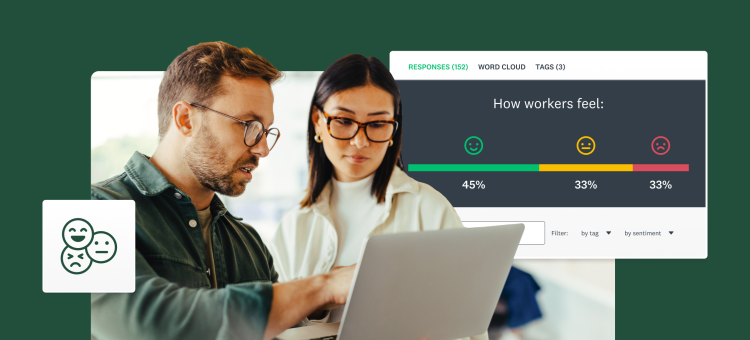One in five American adults experience mental health issues.
Despite how common it is, there's often a stigma about mental health that prevents us from discussing it more openly, both in our personal and professional lives.
We partnered with Glamour to explore the state of mental health among adults at work and in their personal lives. We asked more than 4,000 people on SurveyMonkey Audience how mental health affects their life and who they feel comfortable opening up to. Here’s what we’ve learned:
A variety of factors can worsen mental health
A high number of people experience issues related to mental health.
A quarter of young adults—ages 18-29—report their overall mental health as either “fair” or “poor”. Though the numbers dip as people age, they remain high. For example, 20% of adults between 30-44 years old experience “fair” or “poor” mental health.
What are the root causes of self-described “fair” or “poor” mental health? It depends on the individual. Feeling like you can't open up and the tendency toward anxiety inducing behaviors online can worsen your condition. Here’s what we found out:
1) It’s difficult to open up to those you’re closest with. Only 52% of adults feel comfortable discussing their mental health with their partner; 49% feel comfortable bringing it up to their family.
2) Social media can make things worse. 32%—and 40% of young adults—say that social media stresses them out or gives them anxiety at least half of the time they use it.
3) Looking to the internet for answers. 27% use the internet to gather more information about mental health. That may not seem like a bad thing, but our survey also found that young adults are more likely to depend on the internet for answers than they are to consult with mental health professionals.
Though the factors that contribute to poor mental health are hard to pin down, the impact it has on employees is clear.
It can affect your entire organization
Mental health has a far-reaching effect on employees’ job performance and careers.
A high proportion of employees face mental health challenges that impact their work (26%). What’s more, the mental wellbeing of your co-workers and bosses can also impact you. For example, 9% of employees cite their co-workers' mental health and 12% cite their boss’s mental health factors that impact their job performance or career advancement.
Roadblocks to job performance and career development are the top reasons employees leave companies. And when employees leave, your organization takes a significant hit. It can cost your organization roughly 33% of an employee's salary just to train them and get them up to speed.
Strategies for improving employees’ mental health
So how can your organization address the issue? By fostering a culture where employees are comfortable speaking up and getting the help they need. Here are two approaches that can effectively accomplish this:
1. Offer employees guidance and counseling support services. It’s equally important that these services are widely communicated to your organization. If your employees don’t know they exist, they won’t use them.
2. Train management to have thoughtful and judgment-free discussions about mental health. Management isn’t expected to cure their employees, but they can help facilitate candid discussions and have a working knowledge for directing them to the right resources.
When asked whether they feel support from the current employer, roughly two thirds of employees reported feeling like they got “a little”, “not so much”, or “none at all.” And 4% of employees said they would bring up their mental health to their boss.
Discussing mental health can be extremely challenging, but employers can play an active role in helping people feel less vulnerable by facilitating honest and productive conversations about wellbeing. Once people feel comfortable taking the right steps to improve their mental health, then everyone, including your organization as a whole, stand to benefit.
Start asking questions and listening to employees so you can truly understand their experience. Check out our employee engagement survey templates for inspiration!
Create your own stories based on data
Our content marketing guide will teach you everything you need to know about creating content based on original research from survey data.



